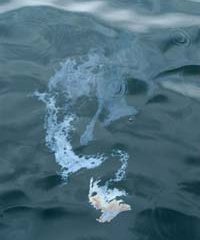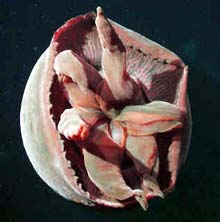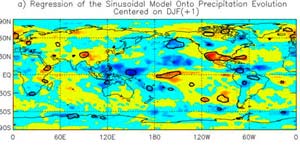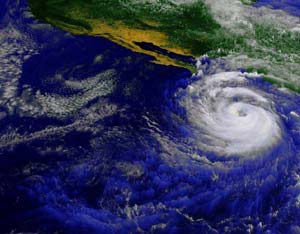
Woods Hole Oceanographic Institution (WHOI) scientists from diverse disciplines have responded to the April 27 spill of nearly 15,000 gallons of No. 6 fuel oil into Buzzards Bay, drawing on decades of experience studying the effects of oil spills on the marine and coastal environment.
Marine chemists have collected dozens of oil samples spilled into Buzzards Bay by the barge Bouchard 120 to determine the chemical composition of the petroleum spilled and its potential toxicity. Biologists

In photographs, it looks like a big red spaceship cruising the ocean depths. But it’s actually a new species of jelly that was discovered and described by scientists at the Monterey Bay Aquarium Research Institute. MBARI scientists published their research on this unusual animal in a recent online version of the journal Marine Biology.
With a bell diameter of up to a meter wide, the new jelly, named Tiburonia granrojo or “big red,” would seem tough to miss, except that it lives deep below t

NASA-funded researchers have discovered El Niño’s soggy secret. When scientists identified rain patterns in the Pacific Ocean, they discovered the secret of how El Niño moves rainfall around the globe during the life of these periodic climate events when waters warm in the eastern Pacific Ocean.
The results may help scientists improve rainfall forecasts around the globe during the life of an El Niño, and may also offer new insights into how an El Niño develops.
The findings were hi
Using a new analysis of satellite temperature measurements, scientists from the Lawrence Livermore National Laboratory have determined that uncertainties in satellite data are a significant factor in studies attempting to detect human effects on climate.
Since 1979, Microwave Sounding Units (MSUs) have been flown on 12 different polar-orbiting weather satellites operated by the U.S. National Oceanic and Atmospheric Administration. MSU instruments measure the microwave emissions of oxygen mo
In honor of the Earth Day celebration, NASA scientists unveiled the first consistent and continuous global measurements of Earth’s “metabolism.” Data from the Terra and Aqua satellites are helping scientists frequently update maps of the rate at which plant life on Earth is absorbing carbon out of the atmosphere.
Combining space-based measurements of a range of plant properties collected by the Moderate Resolution Imaging Spectroradiometer (MODIS) with a suite of other satellite and su

Researchers found surprising evidence of sea salt and frozen plankton in high, cold, cirrus clouds, the remnants of Hurricane Nora, over the U.S. plains states. Although the 1997 hurricane was a strong eastern Pacific storm, her high ice-crystal clouds extended many miles inland, carrying ocean phenomena deep into the U.S. heartland.
Kenneth Sassen of the University of Utah, Salt Lake City, and University of Alaska Fairbanks; W. Patrick Arnott of the Desert Research Institute (DRI) in Reno,